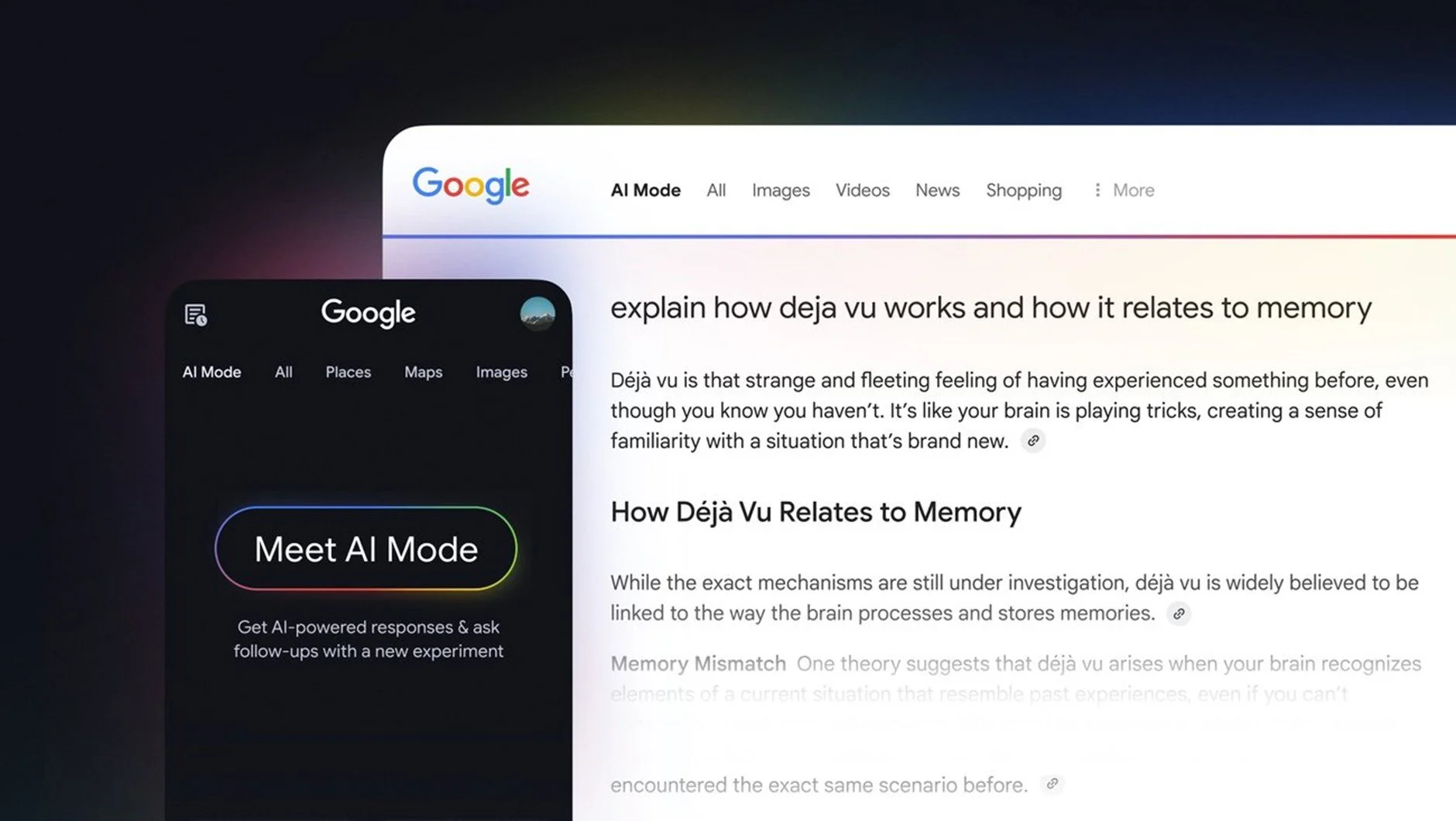AI Mode: How Google’s next chapter will shape travel marketing
Search is evolving. Fast.
AI tools like ChatGPT and Perplexity are reshaping how people find and filter information, with ChatGPT seeing 500 million weekly users and Perplexity surpassing 100 million monthly queries. While they still represent a small share of global search, their impact is growing.
At the same time, search behaviour is shifting. Nearly one in four internet users now turn to social platforms as their primary search tool, rising to 46% among Gen Z. TikTok, Instagram, and YouTube are increasingly where travel research begins.
In response, Google has been building its own generative search capabilities. AI Overviews launched in the UK last year, surfacing instant, AI-generated summaries on top of standard results. In May this year, Google unveiled AI Mode - a more immersive, conversation-first experience now available in the US and the UK, accessible via a separate tab on the Google homepage.
These changes signal a new era for search and major implications for how travel brands drive visibility and bookings.
What is AI Mode?
AI Mode reimagines Google Search as an interactive experience. Instead of 10 blue links, users see dynamic summaries, follow-up prompts, shopping results and visuals - all designed to resolve intent faster. Built on Google’s Gemini model, AI Mode offers:
Synthesised answers from multiple sources.
Suggested follow-ups to deepen the search.
Embedded shopping, maps, ads and content carousels.
Booking tools integrated into high-intent queries.
Organic Search: What’s changing?
Now: The impact of AI Overviews
AI Overviews are already shifting how users engage with search results. Informational and long-tail queries are especially affected, with users often getting the answer and stopping before clicking through, a phenomenon known as ‘zero-click’.
This marks a shift toward Generative Engine Optimisation (GEO), where the goal is not just to rank, but to be cited or referenced within the AI layer, focusing on an evolving measurement framework to understand organic performance.
Next: Preparing for AI Mode
As AI Overviews serve more queries and AI Mode becomes more integrated, SEO and GEO need to work harder across more touchpoints. Key actions include:
Structuring content to be picked up and cited in summaries.
Demonstrating authority through reviews, clear authorship and validation.
Ensuring strong technical SEO, especially serving core content in HTML rather than JavaScript, which AI and crawlers struggle to process.
Building off-site presence - in guides, forums and social channels where Google draws context.
If you’re only visible on your own website, you’re only part of the story.
“AI Mode will undoubtedly offer a more tailored, personalised user experience to the general public, but will change the status quo of digital marketing. A challenging but exciting time for travel brands and agencies lies ahead.”
Paid Search: AI Integration now and next
Now: Placements in AI Overviews
AI Overviews already include ads. From sponsored carousels to shopping cards embedded directly in the experience. While impressions are typically lower, engagement and conversion quality often improve.
Next: What AI Mode means for paid
As AI Mode scales, paid search will need to adapt to a more conversational, visual, and context-driven experience. Expect:
Ads are placed natively within AI summaries and tools.
Fewer broad matches, more intent-based placements.
Creative that fits the format, mobile-first, helpful, and aligned with the AI response.
New ad types, from booking widgets to itinerary suggestions, are integrated directly into Google’s UI.
First-party data, smart targeting and responsive creative will be key to maintaining visibility and performance.
Final thoughts
AI Mode marks the most significant shift in search since the introduction of mobile-first indexing. It changes how people discover, decide and book and demands a new approach to being found.
Search is no longer about rankings alone. It’s about influence, structure and visibility across the entire web.
Travel brands that adapt early by creating content that AI understands, optimising technically, and showing up across the digital journey, will be the ones users (and machines) choose.
Want to get ahead of AI Mode?
Our SEO and Paid Search teams are already helping UK travel brands test, adapt and grow within the new search landscape. Let’s talk.
Dan Ward
Dan is a key architect of our digital strategy, fusing data-driven thinking with creative problem-solving to deliver measurable results. Appointed Digital Director in June 2024, Dan leads with clarity, rigour, and a passion for turning performance data into digital breakthroughs.













